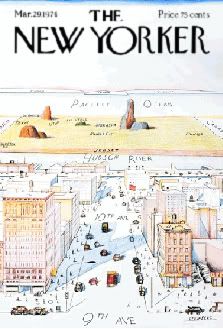New York: Jazz Mecca, Economic Hell, Talent Sap?
 Over at Mostly Music, bassist Ronan Guilfoyle has some really insightful thoughts about the joys and challenges of the New York jazz scene, its impact on players there, and the repercussions on the US jazz scene as a whole of having such an overwhelming percentage of the country's best musicians in one place. Since I agree with pretty much all of it, I'm going to just present a big excerpt:
Over at Mostly Music, bassist Ronan Guilfoyle has some really insightful thoughts about the joys and challenges of the New York jazz scene, its impact on players there, and the repercussions on the US jazz scene as a whole of having such an overwhelming percentage of the country's best musicians in one place. Since I agree with pretty much all of it, I'm going to just present a big excerpt:
On the one hand there’s an extraordinary concentration of great musicians in a very small area, making for a hothouse creative atmosphere and an abundance of players on every instrument who play on a very high level... On the minus side it has to be said there are just far too many musicians in New York for it to make any sense on an economic level. ... The abundance and availability of musicians and the lack of places to play drives the price musicians can charge for NY gigs down to below subsistence levels. ... A lot of the New York musicians I know work in (often menial) day jobs that have nothing to do with music, and the reality for them is that they’re not going to get out of that situation anytime soon.
Been there, done that. It's the biggest reason I left after 8 years--it was painful to be surrounded by so much creativity and yet be so burnt out by a demoralizing but necessary day job that I had very little time or energy left for the music. But that's not the only problem:
As a jazz scene New York reminds me of one of those huge edge of town malls that arrives in an area and sucks all the economic life out of the high streets of any town within 50 miles of it. Nearly the entire US scene is based there, and this ‘gotta go to New York’ mentality means that it’s almost impossible for a regional scene to hold on to its good players. They in turn all arrive in New York where they have to scuffle and jostle for financial crumbs. ... Let’s imagine that say 30 players of every instrument were to leave NY tomorrow and go back to their home cities and expend their energy there and develop their own scenes there, how much healthier would both those regional scenes be and how much better economically would the New York scene be for giving the musicians there a little more economic room to breathe?
I think this does happen to an extent--here in the Bay Area, for example, there are players coming and going from New York all the time, largely for the reasons he mentions above: going there to learn and test their mettle, coming back to have more time for music and feel like a human being again. But as much as I like it here, and know there are great players, how are we supposed to keep good musicians in town when all the clubs are closed and DJs have most of the gigs? Jam sessions are fun (here, I mean--New York, not so much) but they don't pay, not even for the house band.I also think he has a point about a higher level of musicians creating a better scene--I firmly believe that having bad jazz played in public is bad for jazz (since any given performance a passerby witnesses is likely to be his only exposure to jazz that year, and if it's bad, that person will be lost as a potential fan). Of course, you have to play bad jazz before you can play good jazz, and I wouldn't suggest developing players not be out there working through their shit--just that if there isn't plenty of good stuff to show people the music's potential (because most of the best players have already left for NYC, for example), then locals won't be inclined to go to jazz shows and the scene will wither.Anyway, lots of food for thought. Anyone agree/disagree? Ideas to rectify this other than (as Guilfoyle jokes) "forced repatriation"?
